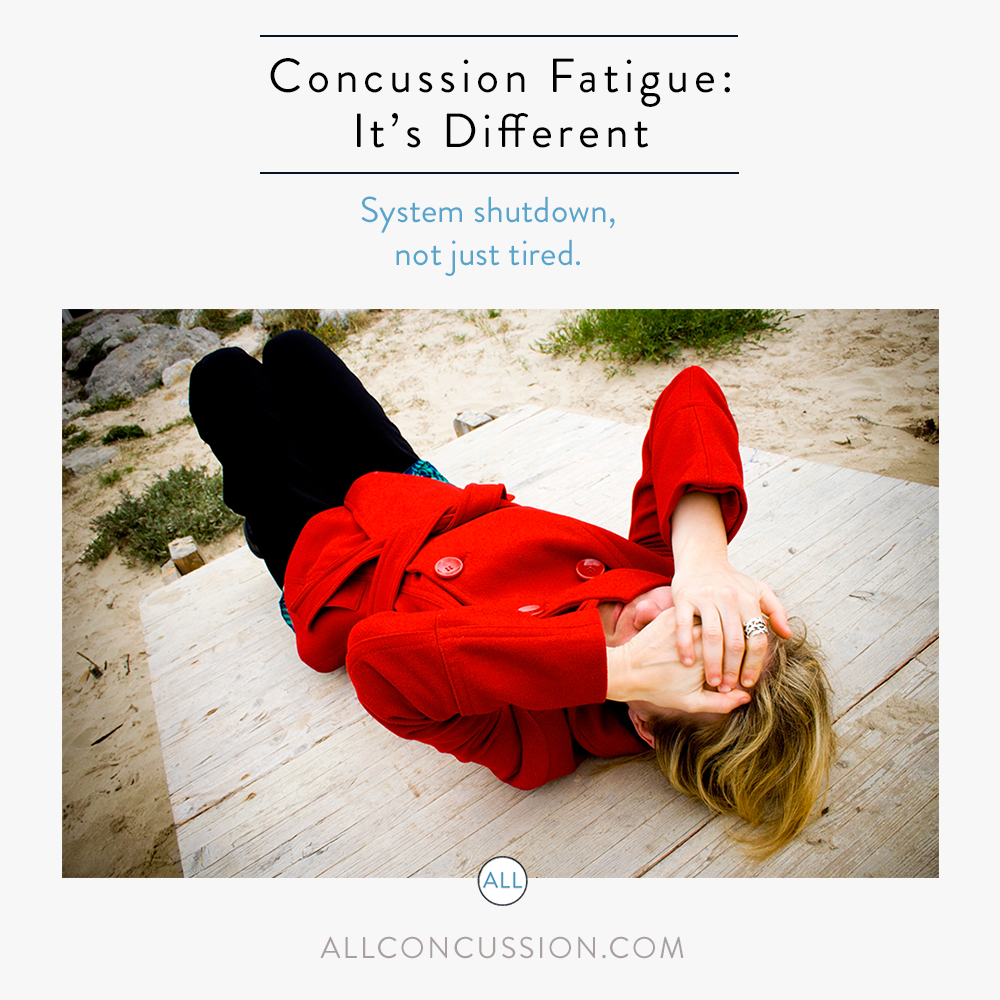 Fatigue is one of the main symptoms of concussion. However, it’s a different type of fatigue than what people expect or realize. Those without concussions base their perception of fatigue due to concussion on what they themselves have experienced.
Fatigue is one of the main symptoms of concussion. However, it’s a different type of fatigue than what people expect or realize. Those without concussions base their perception of fatigue due to concussion on what they themselves have experienced.
My experience was that this is an entirely different type of fatigue. So different that I think it deserves its own category.
I believe that there are at least three types of fatigue:
– Physical
– Cognitive
– Concussion (what I call it)
Physical
 This is the plain ol’ everyday type of fatigue that everyone is familiar with. It’s the kind of tiredness you feel if you’ve stayed up too late or not had enough sleep, or done too much physical activity and the like. Normally, this is generally intermittent and can be addressed by resting and getting more sleep. If you really needed to, you could continue to function even though very tired. You might feel like you can’t, but you could.
This is the plain ol’ everyday type of fatigue that everyone is familiar with. It’s the kind of tiredness you feel if you’ve stayed up too late or not had enough sleep, or done too much physical activity and the like. Normally, this is generally intermittent and can be addressed by resting and getting more sleep. If you really needed to, you could continue to function even though very tired. You might feel like you can’t, but you could.
Cognitive
 This is also referred to as mental fatigue. It’s when you’ve been thinking continuously for a block of time. For instance, it could be studying, taking a test, or working at your desk for a number of hours. Those sorts of activities. Your brain just gets to where you need a break. This is also usually intermittent and resolved by sleep. Just like regular fatigue, you could continue to function if need be.
This is also referred to as mental fatigue. It’s when you’ve been thinking continuously for a block of time. For instance, it could be studying, taking a test, or working at your desk for a number of hours. Those sorts of activities. Your brain just gets to where you need a break. This is also usually intermittent and resolved by sleep. Just like regular fatigue, you could continue to function if need be.
Concussion
 This is like nothing else you’ve ever experienced. In my opinion, anyone that hasn’t had a head or brain injury (doctors included) can’t possibly know how this feels. I believe that they also think that what you’re experiencing is regular or cognitive fatigue. It’s not the case. It’s very different.
This is like nothing else you’ve ever experienced. In my opinion, anyone that hasn’t had a head or brain injury (doctors included) can’t possibly know how this feels. I believe that they also think that what you’re experiencing is regular or cognitive fatigue. It’s not the case. It’s very different.
For me, concussion fatigue occured daily. It took over; I could not do anything except stop immediately and rest. That lasted for for several hours (or more). Some days were better than others, but I usually hit a wall at some point in the day.
It always hit me without warning. One minute I’d be generally OK and functioning (well, as best I could). Then my head would feel like it filled up, and whammo – I had to stop whatever I’m doing and rest. For a long time, I felt like I would collapse if I didn’t sit down immediately. I really couldn’t function until I rested or slept for a while. Usually it took several hours for that, at least.
What makes this type of fatigue so different is that you absolutely cannot work through it. Before my accident, I used to participate in super-sprint triathlons. That required long sessions of hard cardio training to prepare. It also took a lot of physical effort during the race and mental effort to push when my body was very tired. In years past, I also participated in a two-day cycling event (100 miles two days in a row), and have climbed a mountain numerous times. All those activities require an ability to push through normal fatigue resulting from endurance-level physical exertion. So, even though very physically tired (regular fatigue), I was able to dig deep mentally and push through it.
For cognitive fatigue, I worked for years as a technical writer in software companies. There were constant deadlines and you had to work, test, analyze, write and other such tasks at an incredibly fast pace. There was always pressure. You had to always think fast and produce quickly. So I’m accustomed to working through cognitive fatigue as well.
You cannot push through concussion fatigue. No way, no how. At least, I was unable to. You just have to ride it out and hope it doesn’t last too long that day.
Concussion fatigue is very different than other types of fatigue. It needs to be recognized as such and addressed in a different way. Until people acknowledge that this is indeed different, no progress will be made.
Update: December 26, 2014 In the time since I wrote this post, I’ve begun to describe this as more like fainting. I think it’s a good way to describe it in a way people understand. People know what fainting is, and that it’s different than being tired. For me, this concussion fatigue was like a light switch turned off and I was unable to do anything but rest. It was a total system shutdown. My head would fill up, sounds became bothersome loud noise, light intensified and became uncomfortable or painful, and all I could do was rest or sleep to get through it. You’re not tired; your body has stopped working for the time being. You’d give anything to just be “tired.” It’s time to call it something other than fatigue.
Take a look at the three photos I selected for this post. They’re stock photos; I’m using them as examples. The first two show the different types of fatigue most people experience. The third, I think, captures concussion fatigue. For me, I thought the picture represented or could show having to lay down, hands covering your eyes to block the light or hold your head to try and lessen the discomfort or pain, or both, and essentially just being immobile (as in “please don’t make me move; I can’t at the moment”). So there you go. I hope that helps explain the difference.
